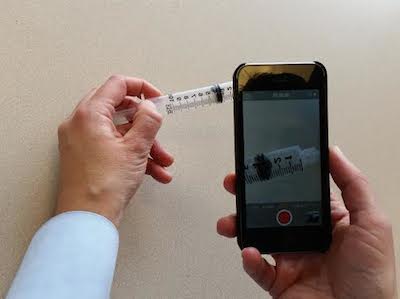 At Boston Children's Hospital's second annual Innovator's Showcase this week, researchers and clinicians presented a number of new technology-focused offerings that are currently in use or being tested at the hospital. Here are four digital health tools that were on display at the showcase.
At Boston Children's Hospital's second annual Innovator's Showcase this week, researchers and clinicians presented a number of new technology-focused offerings that are currently in use or being tested at the hospital. Here are four digital health tools that were on display at the showcase.
RNSafe -- Boston Children's FastTrack Innovation in Technology (FIT) team is testing a new app, called RNSafe, which stands for Remote Nurse witness Supporting Medication Administration For Efficient Care. The app, created by nurses in the hospital, aims to help increase patient safety when administering medications. Boston Children's Registered Nurse and Business Analyst Jennifer Taylor told MobiHealthNews that complex medications need to be verified by two nurses before they are administered, so she and a few of her colleagues decided there should be a way for two nurses to collaborate on that remotely, over video chat. Using RNSAFE, a bedside nurse will request a verification via an iOS device -- Taylor said they chose iOS for bedside nurses because the photo quality is better -- and then a "bunker nurse" will get an alert that a medication needs to be administered. Bunker nurses will then use a Microsoft Surface Pro device to video chat with the bedside nurse to verify the order and do the requisite ten rights of medication giving. After this process has been completed, they sign off on it in the medical record.
Thermia -- A few members of the team behind Boston Children's HealthMap -- Jared Hawkins, a National Library of Medicine Research Fellow in biomedical informatics, and Associate Professor of Pediatrics John Brownstein -- have developed a decision support tool for fevers and associated febrile illnesses, for example respiratory and gastrointestinal illnesses. Parents enter the child's age and temperature into a web app and then answer a few extra questions via the web app. They then have the option to enter some identifying information including their name, email, and zip code. Once they are finished entering data, Thermia will offer the parents suggestions about how to proceed, like whether they should call a doctor.
The goals of the website are to "educate parents about potential underlying causes of symptoms", inform parents how they can treat the children at home, and use the data, which is anonymized, to track disease.
Thermia's tool has been licensed by Raiing, maker of a smartphone-connected thermometer. Raiin will add Thermia's offering to their app. Hawkins is a research collaborator with Raiing.
Advanced Seizure Tracking and Warning Systems -- Boston Children's Associate Professor of Neurology Tobias Loddenkemper presented an algorithm he developed with his fellow researchers and the MIT Media Lab. The algorithm, which is designed to be incorporated into a smartphone app, can detect seizures in patients with epilepsy based on data from health monitoring wearables. Already, Milan, Italy-based Empatica is using the algorithm for their wristworn enterprise tracker device, E4. Loddenkemper explained that although the E4's electrodermal activity (EDA) sensors and accelerometry sensors are good when researchers and clinicians want to track a patient that has generalized tonic-clonic seizure, a different set of sensors, like electrocardiography, would be needed to track other forms of epilepsy.
AudioHub -- Researchers created AudioHub, a clinical audiology app, to help audiologists record data from audiological assessments. Audiologists can use the app to document data on the iPad app, which will be sent to a patient's EHR. The app is used by 30 audiologists at Boston Children's who see over 1,000 patients every month. Diagnostic Audiology Director Derek Stiles told MobiHealthNews that in the future, the researchers will use the saved data for additional research.

















